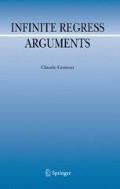Abstract
In this chapter I will explore the logic governing derivations of infinite concatenating regresses. There are at least two reasons why it is important to understand this logic: it will help us to improve our presentation and evaluation of infinite regress arguments that use concatenating regresses; and such regress arguments seem to be the most common. To facilitate this exploration I will make use of the notion of a recurring term, or a loop, and then prove that a regress formula entails a concatenating regress only if it blocks all possible recurring terms, or in other words, only if it blocks all possible loops. A further goal is to show that a strictly formal analysis of a regress formula is inadequate to give a complete account of the derivation of its intended concatenating regress: various semantic and contextual aspects of regress formulas need to be considered.
Access this chapter
Tax calculation will be finalised at checkout
Purchases are for personal use only
Notes
- 1.
We now have further evidence that the use of “self-reference”, “self-application” or “self-representation” (Jacquette and Johnstone, 1989), mentioned at the end of Section 1.5, to describe one of the logical mechanisms involved in generating an infinite regress is not accurate. For any genuine self-reference or self-application creates a loop, and consequently, no infinite regress is entailed from any self-reference or self-application.
- 2.
This refutes Gardner’s (1965: 130) claim that every infinite series is an infinite regress.
- 3.
Sanford (1984: 109) presents a different proof.
- 4.
Sanford (1984: 110) expresses the same idea but he does not present any proof: “a series that does not loop may be ordered by a relation that is not transitive. I do not know how to defend the claim that any argument against looping must appeal to transitivity”. John Post (1992: 210–211) believes that transitivity is a necessary condition. His mistake is a result of generalizing from the logic of infinite regresses of justification discussed by Black (1988).
- 5.
Sanford (1984: 110) and Day (1986: 43) are aware that the explicit concatenating relation(s) of a regress formula might not be the relation(s) responsible for the blocking of all possible loops. They do mention that an explicit relation can entail an asymmetric and transitive relation that will do the required blocking. However, they do not explore any further implicit loop-blocking aspects of a regress formula.
- 6.
Johnstone (1996: 95) and Sanford (1984: 102–103) present similar loops against this regress.
- 7.
Much of the literature on the Third Man Argument overlooks this way of exploring the meaning of “partaking”: Sellars (1955), Vlastos (1955, 1967, 1969), Peck (1962), Moravcsik (1963), Strang (1963), Geach (1967), Shiner (1970), Teloh (1972), Diaz (1978), Goldstein and Mannick (1979), Black (1996).
Author information
Authors and Affiliations
Corresponding author
Rights and permissions
Copyright information
© 2009 Springer Science+Business Media B.V.
About this chapter
Cite this chapter
Gratton, C. (2009). The Formal and Nonformal Logic of Infinite Concatenating Regresses. In: Infinite Regress Arguments. Argumentation Library, vol 17. Springer, Dordrecht. https://doi.org/10.1007/978-90-481-3341-3_2
Download citation
DOI: https://doi.org/10.1007/978-90-481-3341-3_2
Published:
Publisher Name: Springer, Dordrecht
Print ISBN: 978-90-481-3340-6
Online ISBN: 978-90-481-3341-3
eBook Packages: Humanities, Social Sciences and LawPhilosophy and Religion (R0)

